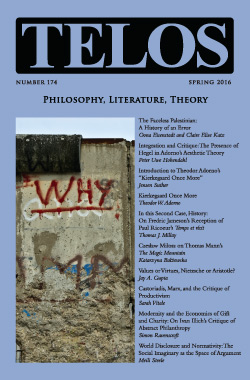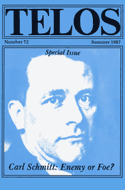In today’s episode of the Telos Press Podcast, David Pan talks with Matthew Sharpe about his article “Solitaire/Solidaire: Camus, Contemplation, and the Vita Mixta” from Telos 196 (Fall 2021). An excerpt of the article appears here. In their conversation they discussed the ways Albert Camus engaged himself politically during his life; how Camus justified his aesthetic work in relation to his political activity; how he responded to critiques of his focus on contemplation rather than political engagement; and how he understood the relationship between aesthetic contemplation and philosophical contemplation. If your university has an online subscription to Telos, you can read the full article at the Telos Online website. For non-subscribers, learn how your university can begin a subscription to Telos at our library recommendation page. Print copies of Telos 196 are available for purchase in our online store.
|
In today’s episode of the Telos Press Podcast, Camelia Raghinaru talks with Justin Neville Kaushall about his article “Natural Spontaneity, or Adorno’s Aesthetic Category of the Shudder,” from Telos 192 (Fall 2020). An excerpt of the article appears here. If your university has an online subscription to Telos, you can read the full article at the Telos Online website. For non-subscribers, learn how your university can begin a subscription to Telos at our library recommendation page. Purchase a print copy of Telos 192 in our online store. As an occasional feature on TELOSscope, we highlight a past Telos article whose critical insights continue to illuminate our thinking and challenge our assumptions. Today, Lillian Hingley looks at Peter Bürger’s “Adorno’s Anti-Avant-Gardism” from Telos 86 (Winter 1990–91). Peter Bürger’s Theory of the Avant-Garde (1984) is one of the landmark texts on aesthetic theory published in the twentieth century. One of the book’s significant claims is that modernism and the avant-garde should be defined as distinct aesthetic movements; specifically, he defines modernism as the less radical cousin of the avant-garde. This distinction is important to note because it is also the crux of Bürger’s thesis in a later article, “Adorno’s Anti-Avant-Gardism,” a historicist critique of Adorno’s “modernist” aesthetic theory that was published in Telos 86 (Winter 1990–91). By acknowledging the pre-established position Bürger was bringing to this article, we can question how useful his distinction may be when constructing an Adornian aesthetic theory today. Hyeryung Hwang’s “Deleuze, Affect Theory, and the Future of Realism” appears in Telos 181 (Winter 2017). Read the full article at the Telos Online website, or purchase a print copy of the issue in our online store. Individual subscriptions to Telos are now available in both print and online formats. In this essay, I critically address the current prominence of affect theory and its close affiliation with the aesthetic absolute of high modernism. In doing so, I demonstrate how affect theory, which has been significantly influenced by Gilles Deleuze, relays a restrictive recognition of the functions of consciousness, representation, and agency as rigid codification, despotic power, and authoritative unity. Certain issues arise when affect theory registers itself as a promising and effective political theory, and I address these issues by investigating Deleuze’s discussion of affect in his various texts on aesthetics and politics. Telos 174 (Spring 2016): Philosophy, Literature, Theory is now available for purchase in our store. |
||||
|
Telos Press Publishing · PO Box 811 · Candor, NY 13743 · Phone: 212-228-6479 Privacy Policy · Data Protection Copyright © 2025 Telos Press Publishing · All Rights Reserved |
||||

 In his essay “Political Aesthetics: Carl Schmitt on Hamlet,” David Pan puts forward an interpretation of the relationship between aesthetics and politics in Schmitt’s discussion of Hamlet. Today the question about the relationship of aesthetics and politics in the thought of German jurist is a widely discussed topic. According to one interpretation, which is best represented by a sentence of Jürgen Habermas, “Carl Schmitt’s polemical discussion of political Romanticism conceals the aestheticizing oscillations of his own political thought.” But according to Schmitt’s self-understanding, this interpretation could not be further from the truth.
In his essay “Political Aesthetics: Carl Schmitt on Hamlet,” David Pan puts forward an interpretation of the relationship between aesthetics and politics in Schmitt’s discussion of Hamlet. Today the question about the relationship of aesthetics and politics in the thought of German jurist is a widely discussed topic. According to one interpretation, which is best represented by a sentence of Jürgen Habermas, “Carl Schmitt’s polemical discussion of political Romanticism conceals the aestheticizing oscillations of his own political thought.” But according to Schmitt’s self-understanding, this interpretation could not be further from the truth. 

